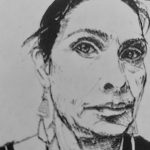

By: Gail Obenreder
“Although I write to please myself, in doing so I write for those out in the world who feel alone in their histories. My work is about how to forgive, how to heal, and thus belong.”
JoAnn Balingit is a second-generation Filipina American whose writing has been shaped by the fact that “my parents were not storytellers. They hid their pasts, as some in their generation were taught to do.” In her poems – and now in her memoir, a series of lyric essays that garnered her the Division’s Artist Fellowship – Balingit works to “subvert that training, to make the invisible visible.”
Growing up in Lakeland, Florida in a large, multi-racial family, Balingit was a creative child who discovered her love of writing in elementary school. But she endured a great sorrow with the deaths of her parents after she turned sixteen. Her memoir follows the writer’s attempts to understand how her inheritance is shaped not only by family love and “many gifts of survival,” but also by family violence, the burdens of migration, and American colonialism in The Philippines.
Balingit began a stellar college career at Florida State University, graduating magna cum laude, and she published her first poems while in graduate school (a Regents Fellow at University of California/Irvine). There, she was “a grad student who liked hanging out with the MFA students more than the theorists.” After college, she carved out a career as an English teacher in Morocco, Portugal, Florida, and Kentucky and earned two more graduate degrees – an M.L.S. in Library & Information Sciences (Indiana University) and an Ed.D in Education Leadership from University of Delaware (2008).
Sock Drawer
I head downstairs and around the dark corner to spy my eldest son in his child bed, grey sneaker
poking through the captain’s wheel footboard, the familiar angles of his shoulder and hip turned
toward the lavender wall. Upstairs: a turkey half-cooked, speakers blaring Radiohead, collards on
simmer, beers all over the counter. My wisdom crumbles when I try to comfort anyone. Oh hon,
I’m sorry, I say. He sobs and pulls the faded deer blanket over his head.I just don’t want anybody else getting hurt, he says.
No one else is getting hurt, I tell him.
Balingit returned to her poetry in mid-life, “writing poems again when I was 40,” working for 12 years as a librarian in Delaware and Pennsylvania public schools while expanding her artistic practice. She began to achieve wider publication and artistic accolades, including three Pushcart Prize nominations and the Global Filipino Literary Award in Poetry for her collection Your Heart and How it Works. In 2008 Balingit was appointed Delaware’s Poet Laureate, a post she held with energy and distinction for seven years, working visibly and tirelessly to promote arts-in-education initiatives and serving as teaching artist for the National Endowment for the Arts’ Poetry Out Loud program.
Her writing is inspired by a huge and hugely diverse range of interests and influences – family and children, travel, contemporary writers in all genres, language, nature (especially hiking, trees, turtles, and snakes), her colleagues, and the effects of “being racialized without grasping it in Southern white Florida culture.” Her memoir-in-progress (currently called What Were the Names of the Trees) is filled with these myriad intellectual and personal currents, and it begins with “the loss of my siblings in the 1970s when I turned sixteen, a brown girl in a white Southern town.”
Balingit is especially moved “when someone I know . . . or don’t know . . . says, ‘This is a beautiful poem, or beautiful story!’ [Then] I know my work has made the world better because it gave joy.” She plans to use her Fellowship to travel for research (to California, Missouri, and the Library of Congress) and “to buy time away to write alone, deeply, somewhere.” Though the pandemic was “hard and exhausting in all the ways we are now familiar with,” Balingit says it was also a boon, significantly expanding her writing community via Zoom. “As far as artistic practice, the quietening of my life has been good for my work to make my discoveries, though dark, joyous.”
Fellowship Home